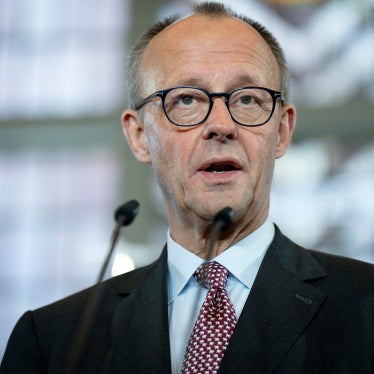Over the past few months, international and local human rights groups have documented numerous serious violations of the laws of war, some of them amounting to war crimes, before, during, and since Israel's military offensive in Gaza last December and January. My own organization, Human Rights Watch, strongly criticized Israel for the shooting deaths of Palestinian civilians carrying white flags and the illegal use of white phosphorus munitions, and Hamas for firing rockets indiscriminately into civilian areas of Israel.
Israeli and Hamas officials have dismissed these criticisms as biased and unfounded. Neither has displayed any readiness to conduct prompt, thorough, and impartial investigations into these serious allegations, as international humanitarian law requires. Nor has either shown a willingness to hold accountable, through fair and credible prosecutions, those responsible for ordering or carrying out attacks against non-combatants.
Investigations and prosecutions are important to ensure respect for the core principle of distinction underlying the laws of war- the need for warring parties, whether regular armies or armed groups, to distinguish at all times between civilians and combatants, and never to target or indiscriminately harm civilians. When serious violations occur, justice is essential to establish the truth, provide an effective remedy to the victims, and discipline or punish those responsible.
Investigations and prosecutions also can deter unlawful behavior and protect civilians from intentional or reckless attack. A striking example of the constructive impact of investigations comes from Iraq. Before early 2006, when Gen. Peter Chiarelli took charge of U.S. Army day-to-day operations, U.S. soldiers were reportedly killing Iraqi civilians at checkpoints at the rate of about one a day. After Gen. Chiarelli ordered that all such fatal shootings be investigated, their frequency dropped by 85 percent.
When a state fails to exercise its obligation to investigate allegations of serious wrongdoing by its forces, international investigation and prosecution is an alternative. This is the rationale underlying the establishment of the International Criminal Court (ICC). But Israel is not a party to the Rome Statute establishing the ICC, and the Palestinian Authority (PA) may lack standing with the ICC, depending on how the ICC's prosecutor chooses to treat the PA's petition seeking his assumption of jurisdiction over the recent war.
Should the prosecutor reject the PA's petition, the ICC could still assume jurisdiction if the UN Security Council were to refer the Gaza situation to the ICC, although referral would be difficult to achieve politically given the veto power of the permanent members of the council.
One potential bridge to ensure that justice is done is the UN Fact-Finding Investigation headed by Justice Richard Goldstone of South Africa, which is scheduled to make its findings and recommendations public in mid-September. The UN Human Rights Council established the investigation in January, but because of the flagrantly biased terms of its mandate - to look at only alleged Israeli violations - no reputable independent investigator agreed to participate. In late March, Justice Goldstone agreed to head up the investigation after re-negotiating its mandate to include serious violations by Palestinians as well. Israel nonetheless refused to cooperate, but Goldstone's team, after gaining access to Gaza via Egypt, heard testimony from Israelis (and West Bank Palestinians) in Geneva.
We don't know what next steps the Goldstone team will recommend, but one useful way forward would be the establishment of a UN mechanism to monitor and report on how Israeli and Hamas authorities discharge their obligation to investigate serious violations committed by their forces and hold accountable those responsible. UN member states should press Israel and Hamas to meet this obligation to ensure credible justice for the alleged crimes. In the event that the parties fail to do so, the international community should strongly back international prosecutions.
At stake is not only justice for the victims of laws-of-war violations in Gaza and Israel, but efforts more generally to ensure that perpetrators of serious international crimes are held to account. The ICC has attracted criticism from some African and other states because its investigations and prosecutions have so far focused on African perpetrators of alleged war crimes and crimes against humanity, most prominently Sudan's President Omar al-Bashir. Any failure of key players like the US and EU to take steps to ensure justice for serious crimes committed by an ally like Israel would reinforce perceptions that the laws of war have consequences only for those without powerful friends.








